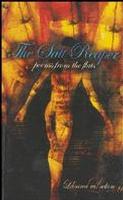Mel Cooke, Freelance Writer

HAVING REVIEWED two or three publications on its imprint, I have come to expect at least two things of the Philipsburg, St. Martin-based House of Nehesi Publishers, namely Caribbean themes and very good writing.
Lasana M. Sekou's The Salt Reaper: Poems from the Flats lives up to these standards with 59 poems over 113 pages between glossy covers in a compact-sized book. The first 18 poems cover the decade 1990-1999, with the remainder being written in the first half of this decade.
NO-NONSENSE APPROACH
The poet's strong sense of nationalism as well as his no-nonsense approach to his craft are evident from the opening No Love Poems:
"There will be no love poems tonight
no lullabies
no pleasant sing-songs
no snow-washed sermons
on the sacrifice of lambs
upon the altars of frocked Pharisees
who kiss up to them Roman massa"
Later in No Love Poems, Sekou introduces the strain of nationalism which runs through the entire book with:
"... we are not permitted
to plant a new banner of colours
in the nipples of the future
to wave at the present for all to see ..."
Sekou is as comfortable in spirituality as sensuality, making several biblical references in The Blockade Next Time, about the protest of January 15, 1990.
With the lines "... to be about our nation's business", "resolved to last for forty days and forty nights" and "tractors will be turned into plowshares of living people", he turns commonly known biblical passages into a call to resolve and resistance, as "we are already standing on the grounds/where we are bound to perish or mold this nation/in our very own image/for freedom not paid for is forfeit".
IMPRESSIVE WRITING
His sheer writing ability is impressive, Sekou packing in philosophy without preaching in Title Deed ("History/is always just ensuing/it is our eternal story") and linking the sensuous and the spiritual with "her delivery repeats the second coming".
Sekou is a Caribbean man, Caribbean Road Work in St. Martin stating this explicitly. He remembers a near-visit to Cuba and Haiti in Visit and Fellowship 1, as he is in Miami at one corner of the triangle of boats and bombast observing:
"I am initiated all over
for the Haiti of my circumcision
I am bleeding again
for the Cuba of my first period."
And if one ever doubted Sekou's affinity for the sensuous, he makes the matter clear in The Cubs Are In The Field, one of the longer (by far) poems in The Salt Reaper, with "before the cock breaks the hymen of spread-legged dawn/inviting us to lick open destiny's lips to orgasmic sight/to see for true where the word to be made flesh".
SENSUOUS OVERTONES
The title poems, Salt Reaping I and Salt Reaping II, near the beginning of the closer to present poems, are short, with a sensuous overtone to the first, even as it recalls the brutal work of salt mining.
Salt Reaping II also makes the connection between sensuality and labour, but in a less direct way with "we keep hearing how/it was sweet but hard/maybe so/it was like loving".
Sekou goes international in a big way with Pilgrim at Jo'burg International, El Malecón about Cuba, Bajan and Haiti 200 ("again/the punished victor/walks before us ...").
The consecutive poems dm1 and dm2, dm3 following after the sole Spanish poem in the collection, delve deep into the "dark man" and his "loot of blings".
However, the most striking line about manhood comes in Sons to the Fathering, where Lasana Sekou writes "mothers cannot father men ...".
True, in more ways than one.












